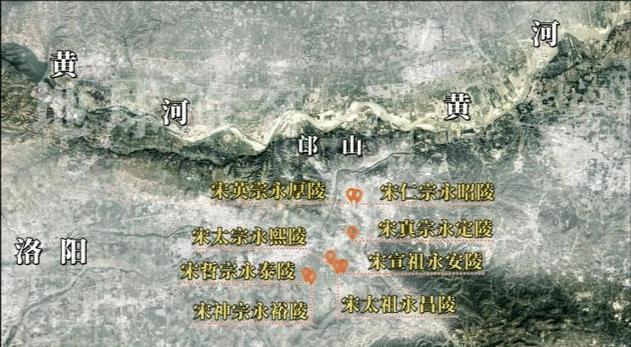
In Gongyi, Henan, near xicun, Caizhuang, urban area and baling village, seven or eight emperors since the founding of the Northern Song Dynasty are buried, historically known as the "Seven Emperors and Eight Tombs". They are the Yong'an Mausoleum of Zhao Hongyin, the father of Zhao Kuangyin, the Yongchang Mausoleum of Zhao Kuangyin, the Yongchang Mausoleum of Zhao Kuangyin, the Yongxi Mausoleum of Zhao Guangyi of Song Taizong, and the Yongding Mausoleum of Zhao Heng of Song Zhenzong.
The Yongzhao Mausoleum of Emperor Renzong of Song, the Yonghou Mausoleum of Zhao Shu of Song Yingzong, the Yongyu Tomb of Zhao Huan of Song Shenzong, and the Yongtai Mausoleum of Zhao Xu of Song Zhezong are also buried next to and near the "Seven Emperors and Eight Tombs" of the tombs of empresses, imperial relatives and princes. There are more than 300 mausoleums in the Song Tombs, covering an area of 156 square kilometers, and more than 700 stone carvings are stored, which have important cultural relics value and artistic value.
The disaster of the Northern Song Dynasty's imperial tomb
In addition to the magnificent cemetery buildings and huge stone statues in the mausoleum area, each imperial tomb is buried with a wealth of funerary products, and under each imperial tomb is buried a piece of history and story, it is a pity that these good historical relics were destroyed by jin soldiers or professional tomb robbery institutions after the fall of the Northern Song Dynasty.
The history book "Chronicles of the Great Golden State" volume 31 "Liu Yulu of the State of Qi" records: "The soldiers of Xijing sold jade note bowls in the three roads of du tong, (Liu) Yu suspected that it was not a folk object, Kan Fengzhi, knew that it was in the mountain mausoleum, so Liu Congshan was made the Henan Taosha official, and the Mercury and other things in the coffin of the FaShan Mausoleum and the Jinren were inexhaustible; Gu Jun was the Panjing Taosha official, and the folk burial cellar and no grave objects were issued." ”
Volume 475 of the History of Song records that "Liu Yu of the Rebels" records: "Shihe, Huai, Shaanxi, and Shandong were all stationed in the Northern Army, and Lin (Liu Yu's son) was composed of more than 100,000 township soldiers for the Thirteenth Army of the Crown Prince's Palace, which was divided into Henan and Beijing Taosha officials, and the tombs of the two capitals were excavated. ”
From the above two historical materials, it can be seen that after the Jin soldiers occupied the Central Plains, they looted the city of Bieliang in Tokyo, and also excavated and destroyed the imperial tombs of the Northern Song Dynasty. After the Jin soldiers left, Liu Yu, a puppet emperor of the puppet Qi supported by the Jin people, set up a tomb robbery officer to carry out a crazy raid on the Northern Song Dynasty imperial tomb and the tombs of the two capitals. The destruction of the imperial tomb by these two raids reached irreparable damage.
After the fall of the Northern Song Dynasty, Zhao Zhuo took the throne at Yingtianfu and established the Southern Song Dynasty, with the capital at Lin'an. From then on, it confronted the Jin Dynasty in the north and south, and the area north of the Huai River was completely in the hands of the Jin people. The Southern Song Dynasty regime was unable to take care of the ancestral tombs of the Central Plains, although it had sent people to repair and maintain the ancestral tombs, and the glory of the Northern Song Imperial Tombs at that time was long gone.
After the Yuan Dynasty, the imperial tombs of the Northern Song Dynasty were left unattended and maintained, and the imperial tomb area was reclaimed as farmland. In the Ming and Qing dynasties, the ruling class paid more attention to the protection of the imperial tombs of the Northern Song Dynasty, and the government specially introduced policies to turn the land in the imperial tombs into official land, set up tomb guards, and prohibited farmers from picking trees and planting crops, which greatly protected the imperial tombs.
What did the Song Dynasty in the wheat field teach us?
The Northern Song Dynasty was a very magical era, although the land area was not large, it created an unprecedented prosperity of China's imperial era of social economy. Regarding the demise of the Northern Song Dynasty, first of all, Wang Anshi failed to change the law, which led to more acute internal contradictions in the Northern Song Dynasty, the people were miserable, and the country was poor and weak.
Secondly, the Northern Song government emphasized literature over force, and its military strength was relatively weak, resulting in weak border defense forces. The external forces represented by the Jin Dynasty were strong, and after the Second Emperor Jingkang was captured, it was difficult for the imperial power representing the authority and dignity of the state to form a cohesive force. Coupled with the huge size of government agencies and huge internal consumption, they have to pay money from external forces every year, which weakens financial resources.
The territory of the Song Dynasty did not include traditional warhorse production areas such as the Hexi Corridor and the Hetao Plain, and these resources were attributed to the northern enemy countries. The prosperous scene of the Song Dynasty is finally like a flower moon in the mirror, and it is broken at the flick of a finger. Those glorious, humiliating, nostalgic and indignant, all melted into the hard stone stele.